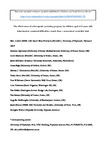The effectiveness of a therapeutic parenting program for children aged 6-11 years with behavioural or emotional difficulties: results from a randomized controlled trial
| dc.contributor.author | Axford, Nick | |
| dc.contributor.author | Bjornstad, G | |
| dc.contributor.author | Matthews, J | |
| dc.contributor.author | Heilmann, S | |
| dc.contributor.author | Raja, A | |
| dc.contributor.author | Ukoumunne, O | |
| dc.contributor.author | Berry, V | |
| dc.contributor.author | Wilkinson, T | |
| dc.contributor.author | Timmons, L | |
| dc.contributor.author | Hobbs, T | |
| dc.contributor.author | Eames, T | |
| dc.contributor.author | Kallitsoglou, A | |
| dc.contributor.author | Blower, S | |
| dc.contributor.author | Warner, G | |
| dc.date.accessioned | 2021-11-22T13:04:37Z | |
| dc.date.issued | 2020-10 | |
| dc.identifier.issn | 0190-7409 | |
| dc.identifier.issn | 1873-7765 | |
| dc.identifier.other | 105245 | |
| dc.identifier.uri | http://hdl.handle.net/10026.1/18398 | |
| dc.description.abstract |
Objective: The aim of the study was to evaluate the implementation and effectiveness of a therapeutic parenting program that targets parents of children aged 6 to 11 years identified as having behavioral and emotional difficulties. The intervention comprises two parts, delivered sequentially: a 10–12-week group-based program for all parents, and one-to-one sessions for up to 12 weeks with selected parents from the group-based element. Methods/Design: In a randomized controlled trial, 264 participants were allocated to the Inspiring Futures program (intervention) or services as usual (control) arms with follow-up assessments at 16 (post-group program) and 32 (post-one-to-one sessions) weeks. The primary outcome was the parent-rated Strengths and Difficulties Questionnaire (SDQ) Total Difficulties score at 32 weeks. Secondary outcomes included parent-rated SDQ subscales, parent coping strategies, empathy in parenting and parenting skills. Results: All 264 participants were included in outcome analyses. There was no statistically significant effect on SDQ Total Difficulties (standardized mean difference: −0.07; 95% CI: −0.30 to 0.16; p = 0.54). There were no sub-group effects. Only 1 of 40 comparisons between the trial arms for secondary outcomes across both follow-ups was statistically significant at the 5% level. The mean number of group sessions attended by intervention arm participants was 6.1 (out of 10 to 12) and only 1 in 20 intervention arm participants received one-to-one support. Independent observation indicated scope to improve fidelity in terms of adherence, quality and participant responsiveness. Conclusions: The intervention is not more effective than services as usual at improving targeted outcomes. This may be related, in part, to implementation issues but arguably more to the inability of a non-behavioral intervention to improve caregiving adequately, particularly when it is not targeted at new parents who have experienced trauma or deprivation early in life or subsequently. | |
| dc.format.extent | 105245-105245 | |
| dc.language | en | |
| dc.language.iso | en | |
| dc.publisher | Elsevier | |
| dc.subject | Parenting | |
| dc.subject | Early intervention | |
| dc.subject | Group psychotherapy | |
| dc.subject | Child behavioral and emotional problems | |
| dc.subject | Randomized controlled trial | |
| dc.title | The effectiveness of a therapeutic parenting program for children aged 6-11 years with behavioural or emotional difficulties: results from a randomized controlled trial | |
| dc.type | journal-article | |
| dc.type | Journal Article | |
| plymouth.author-url | https://www.webofscience.com/api/gateway?GWVersion=2&SrcApp=PARTNER_APP&SrcAuth=LinksAMR&KeyUT=WOS:000577369000008&DestLinkType=FullRecord&DestApp=ALL_WOS&UsrCustomerID=11bb513d99f797142bcfeffcc58ea008 | |
| plymouth.volume | 117 | |
| plymouth.publication-status | Published | |
| plymouth.journal | Children and Youth Services Review | |
| dc.identifier.doi | 10.1016/j.childyouth.2020.105245 | |
| plymouth.organisational-group | /Plymouth | |
| plymouth.organisational-group | /Plymouth/Faculty of Health | |
| plymouth.organisational-group | /Plymouth/Faculty of Health/Peninsula Medical School | |
| plymouth.organisational-group | /Plymouth/REF 2021 Researchers by UoA | |
| plymouth.organisational-group | /Plymouth/REF 2021 Researchers by UoA/UoA03 Allied Health Professions, Dentistry, Nursing and Pharmacy | |
| plymouth.organisational-group | /Plymouth/Research Groups | |
| plymouth.organisational-group | /Plymouth/Research Groups/FoH - Community and Primary Care | |
| plymouth.organisational-group | /Plymouth/Research Groups/Plymouth Institute of Health and Care Research (PIHR) | |
| plymouth.organisational-group | /Plymouth/Users by role | |
| plymouth.organisational-group | /Plymouth/Users by role/Academics | |
| dcterms.dateAccepted | 2020-07-06 | |
| dc.rights.embargodate | 2022-1-12 | |
| dc.identifier.eissn | 1873-7765 | |
| dc.rights.embargoperiod | Not known | |
| rioxxterms.versionofrecord | 10.1016/j.childyouth.2020.105245 | |
| rioxxterms.licenseref.uri | http://www.rioxx.net/licenses/all-rights-reserved | |
| rioxxterms.licenseref.startdate | 2020-10 | |
| rioxxterms.type | Journal Article/Review |


